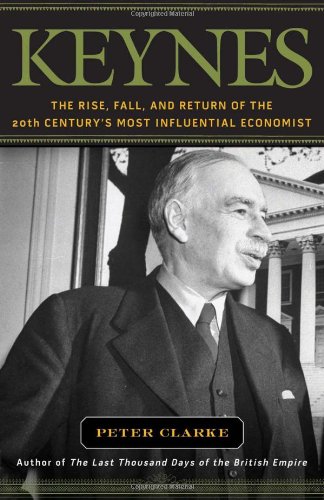
Keynes
The Rise, Fall, and Return of the 20th Century's Most Influential Economist
کتاب های مرتبط
- اطلاعات
- نقد و بررسی
- دیدگاه کاربران
نقد و بررسی

September 1, 2009
"Much as I admire the Americans, when laissez-faire takes the form of agreeing to do whatever the Americans do, I am a little terrified." Thus John Maynard Keynes, savior of capitalism.
It's no small irony that it has taken a second depression to bring Keynesian ideas of government-induced economic stimulus back into fashion, since the first depression was supposed to have provided sufficient reasons for keeping an eye on the economy to ensure that such intervention was not needed again. Cambridge historian Clarke (The Last Thousand Days of the British Empire: Churchill, Roosevelt, and the Birth of the Pax Americana, 2008, etc.) paints a careful portrait of the prophet whose voice was once heard only in the wilderness of social democracy. Ironically, Keynes was only passingly sympathetic to socialism, and his advice to Franklin Roosevelt, who called on the British economist to help think through New Deal–era economic policy, was that the president conduct a"reasoned experiment within the framework of the existing social system" so that capitalism might be kept alive. Clarke writes a touch tunelessly at odd moments ("Keynes served as a temporary wartime civil servant and took to the administrative life like a duck to water"), but his brief but detailed biography makes for, well, stimulating reading in a time when Keynes's notions of stimulus have proved once again to be an economic lifesaver. The author also notes that Keynes did not view government-injected stimulus funds as ideal policy, but that such actions were better in crisis than sitting around and waiting for the free market to straighten itself out, as capitalist orthodoxy holds that it will do. There are lessons aplenty to be drawn from Clarke's recitation of the facts of Keynes's life and thought—not least the lunacy of cutting government spending in tough times.
A useful, timely primer.
(COPYRIGHT (2009) KIRKUS REVIEWS/NIELSEN BUSINESS MEDIA, INC. ALL RIGHTS RESERVED.)

November 1, 2009
These books bring 20th-century economist John Maynard Keynes into the current economic debate. During the 1930s, Keynes pioneered the concept of governments forcing interest rates low and using deficit spending to stimulate the moribund economy. The work by Clarke (modern history, ret., Cambridge Univ.; "The Last Thousand Days of the British Empire") is the most biographical (though none is a true biography), following Keynes from his early life through his role in influencing economic policy during the Great Depression and World War II. Clarke explains Keynes's association with the Bloomsbury Group, his homosexuality, his investing prowess, and how he formulated his theories in response to the economic turbulence of his times. He shows how Keynes was able to change his mind and go in new directions and how he was able to reach out to governments in changing the economic landscape. This is a generally sympathetic portrayal, giving only brief space to Keynes's critics and using academic, but clear, language.
Skidelsky (political economy, emeritus, Univ. of Warwick; "John Maynard Keynes"), author of the major three-volume biography of Keynes, now looks at how studying Keynes could help with both our current crisis and the study of economics in general. After a too brief biographical profile, Skidelsky goes on to explain that much of Keynes's thinking came from his practical involvement with government and investing, which drove Keynes to seek ways in his theoretical musings to stabilize economic markets. Skidelsky skillfully explains how Keynes's views on human behavior, uncertainty, money, and equilibrium formed the basis of his economic theories. He says that modern economists have relied too much on mathematics to predict what Keynes embraced as uncertainty and that Keynes's ideal of economic fairness has merit today when there has been too much emphasis on the raw accumulation of money.
Lewis (cofounder, Cambridge Assoc.; "How Much Money Does an Economy Need?") sets out to refute Keynesian economics and show that it's what has brought the world to the present crisis. Through paraphrasing and verbatim quotations, he presents Keynes's economic arguments from his "The General Theory" and other writings and then offers counterarguments. Regarding Keynes's proposition that government needs to regulate fairness in the markets, Lewis asks how government officials influenced by politics can truly make things fairer. Lewis extends the debate to the current crisis and says that the low-interest-rate environment promulgated for years by governments was Keynesian and the very cause of the current credit crisis and recession. In the end, he dismisses Keynes as a promoter of false utopian theories. Lewis has done a service, even if in the negative, of concisely and critically summarizing Keynes's economic theories, and his book will make readers think. VERDICT All three books are useful for understanding Keynes. Clarke's is recommended for those seeking to know more about Keynes as an individual, Skidelsky's is for those wanting to dig deeper into Keynes' economic prescriptions as they relate to today, and Lewis's more contentious work is highly recommended to anyone seeking both to understand and to question Keynesian economics.
Copyright 2009 Library Journal, LLC Used with permission.

























دیدگاه کاربران